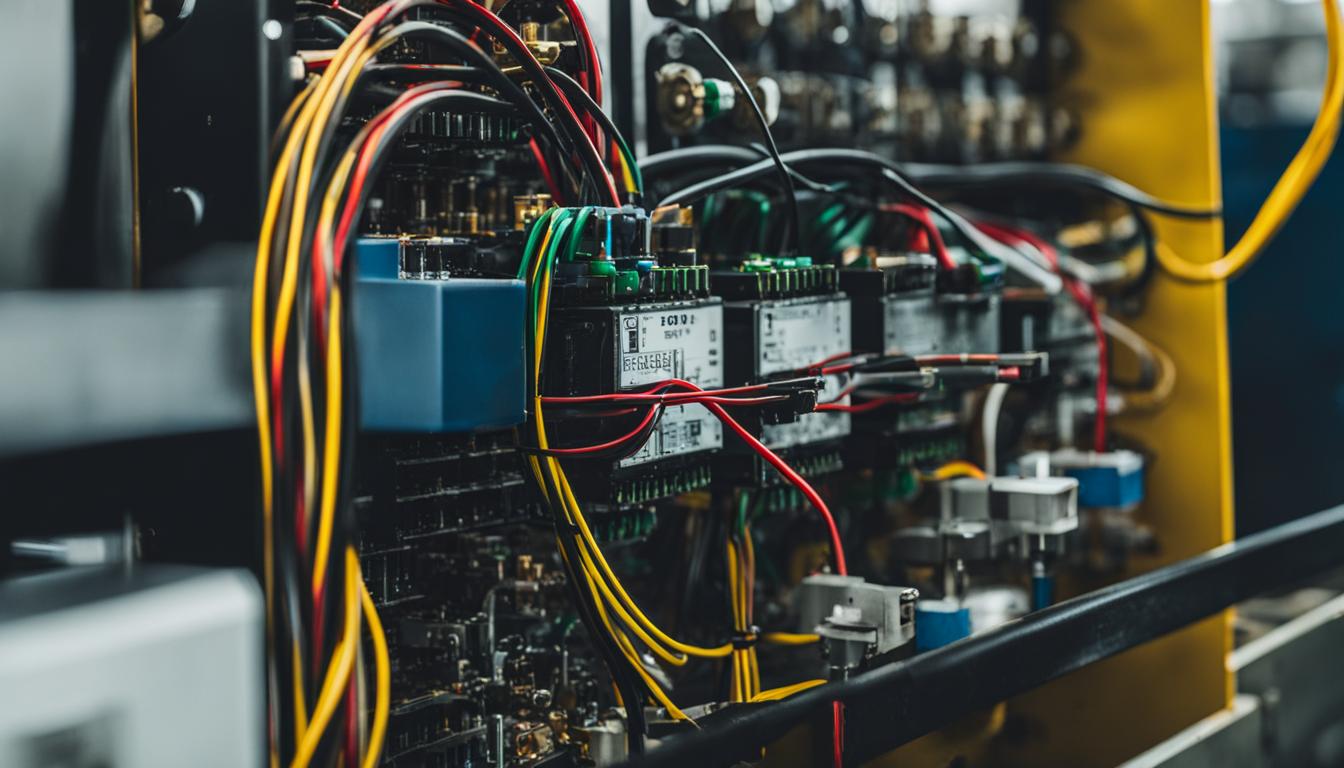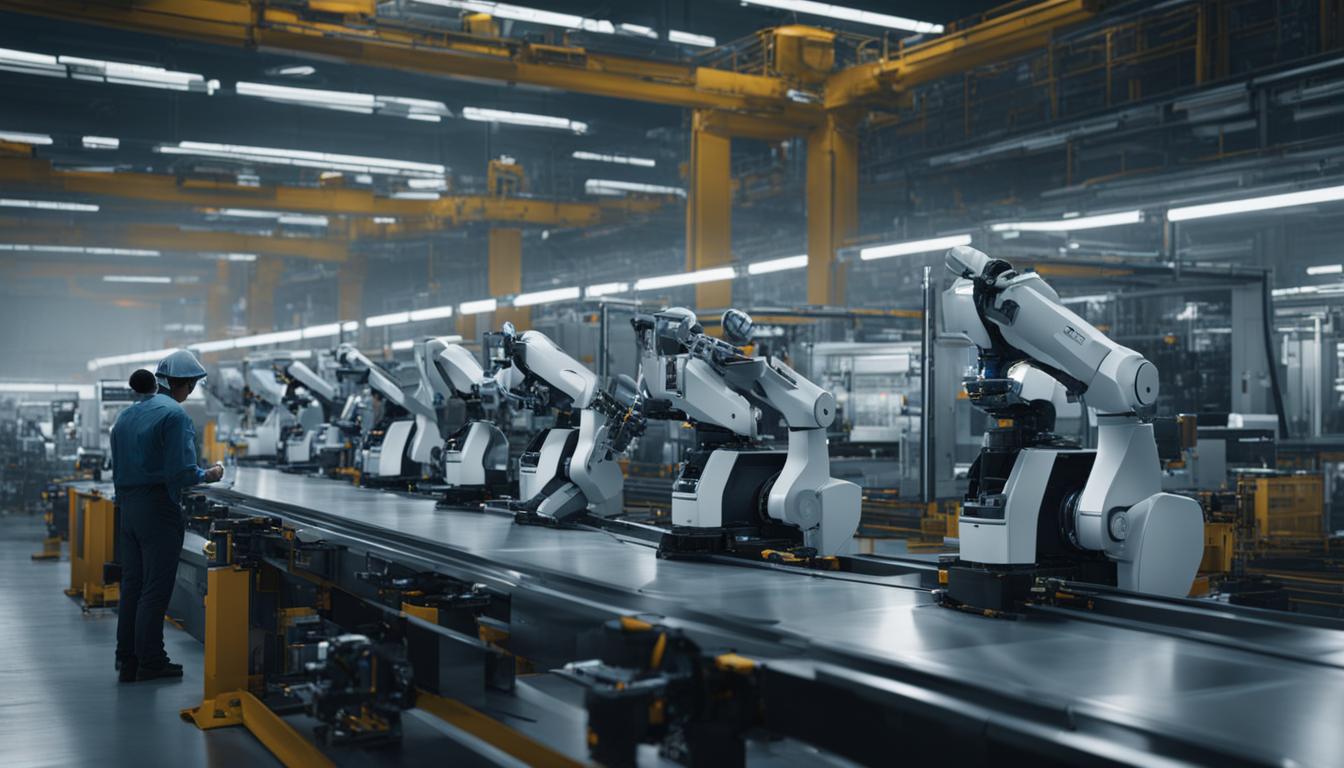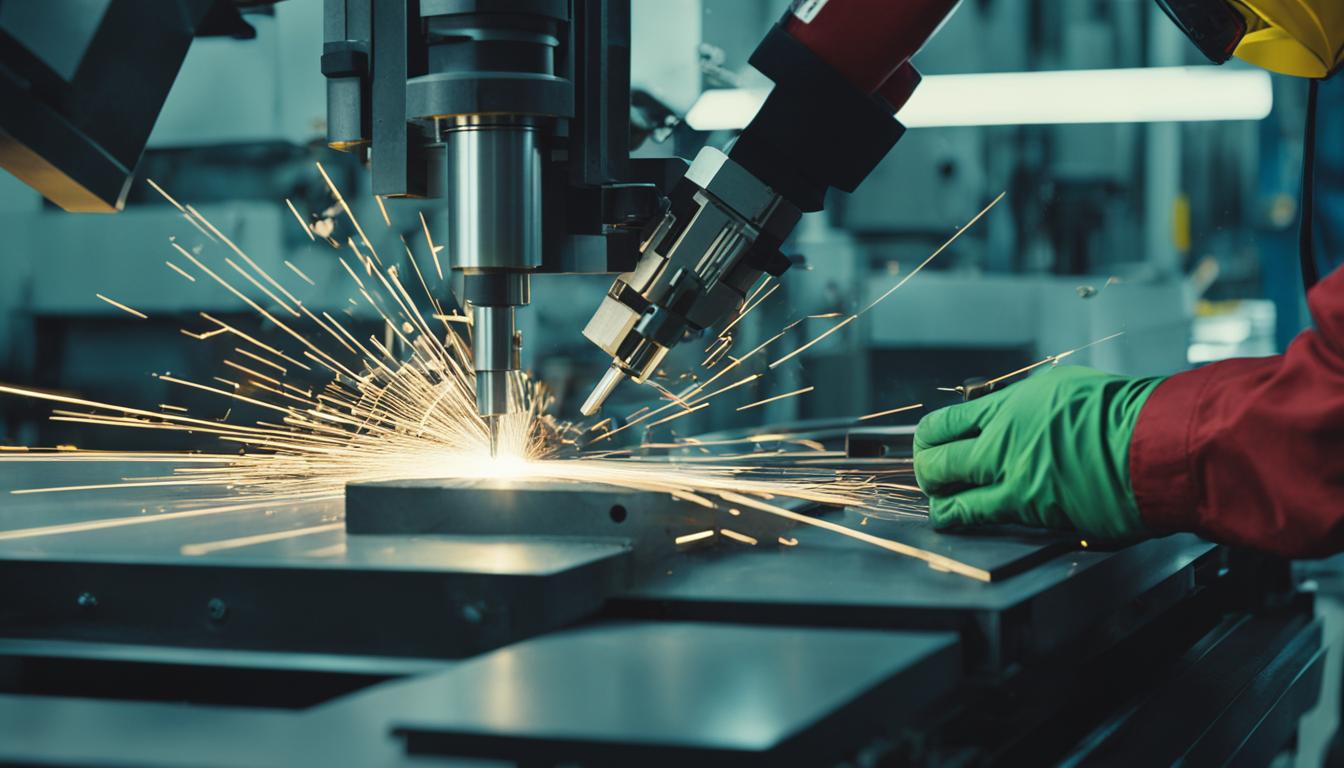Welcome to our article on industrial automation, a transformative force in modern manufacturing. Industrial automation encompasses a range of technologies including automation systems, factory automation, PLC programming, robotics in manufacturing, process automation, industrial control systems, industrial internet of things (IIoT), smart manufacturing, and industrial robotics.
In today’s fast-paced and competitive manufacturing landscape, industrial automation has become an integral part of the fourth industrial revolution, known as Industry 4.0. This revolution includes emerging technologies such as 3D printing, artificial intelligence, augmented and virtual reality, blockchain, and 5G networks.
Industrial automation is the key to achieving greater production flexibility, cost reduction, proactive fault anticipation, and improved safety in manufacturing. By leveraging robotics and sensors, manufacturers can optimize their processes and drive efficiency, precision, and scalability.
At the heart of industrial automation lies a robust SCADA system that connects the entire manufacturing environment. This system, coupled with fast, reliable, and secure telecommunications networks like 5G, enables real-time monitoring, control, and analysis of production operations.
Key Takeaways:
- Industrial automation drives efficiency, precision, and scalability in modern production.
- It encompasses technologies such as automation systems, factory automation, PLC programming, robotics in manufacturing, process automation, industrial control systems, IIoT, smart manufacturing, and industrial robotics.
- Industrial automation is part of Industry 4.0 and enables manufacturers to achieve greater production flexibility, cost reduction, proactive fault anticipation, and improved safety.
- A robust SCADA system and reliable telecommunications networks like 5G are vital for successful industrial automation implementation.
- Industrial automation is a key strategy for manufacturers to stay competitive in today’s evolving manufacturing landscape.
What is Industrial Automation?
Industrial automation plays a crucial role in the world of automated manufacturing and the fourth industrial revolution, often referred to as Industry 4.0. It encompasses a wide range of cutting-edge technologies that shape the digital age, including 3D printing, artificial intelligence, augmented and virtual reality, blockchain, the Internet of Things, quantum computing, and robotics.
In this rapidly evolving era, the factory stands at the forefront of technological change, and industrial automation empowers manufacturers to streamline operations, minimize errors, and optimize the deployment of human labor. Through the effective use of robotics and sensors, industrial automation delivers real-time production flexibility, cost reduction, proactive fault anticipation, and improved safety measures.
Industrial automation goes beyond mere task automation; it enables humans and robots to collaborate and leverage each other’s strengths, creating a dynamic and efficient manufacturing environment. The seamless integration of automation technologies enhances productivity, unlocks new opportunities, and paves the way for the future of manufacturing.
“Industrial automation empowers manufacturers to streamline operations, minimize errors, and optimize the deployment of human labor.”
The Impact of Industrial Automation
Industrial automation brings significant benefits to the factory floor, introducing a new era of efficiency and adaptability. By harnessing technology and embracing automation, manufacturers can revolutionize their production processes, adapt to technological advancements, and stay competitive in an increasingly digital world.
One of the key advantages of industrial automation is its ability to provide real-time production flexibility. By automating tasks and processes, manufacturers can quickly adjust their operations, accommodate changing market demands, and improve response times. This flexibility allows for seamless production variations, efficient resource allocation, and the ability to meet customer expectations in a rapidly changing landscape.
Cost reduction is another notable advantage of industrial automation. By optimizing processes, minimizing waste, and maximizing efficiency, manufacturers can reduce operational costs and enhance profitability. Automation systems enable precise timing, sequencing, and coordination of actions, eliminating human errors and waste, ultimately leading to cost savings.
Moreover, industrial automation facilitates proactive fault anticipation and improved safety measures. Robots and sensors continuously monitor performance, identify anomalies, and predict potential faults before they occur. By detecting and addressing concerns in real-time, manufacturers can prevent costly breakdowns, maintain operational uptime, and create safer working environments.
Industrial automation empowers manufacturers to embrace technological change and leverage the capabilities of the modern factory. By embracing automation, manufacturers can unlock a multitude of benefits and position themselves at the forefront of innovation in the manufacturing industry.
Key Advantages of Industrial Automation
| Advantages | Description |
|---|---|
| Real-time Production Flexibility | Enables quick adjustments to meet changing market demands. |
| Cost Reduction | Optimizes processes, minimizes waste, and enhances profitability. |
| Proactive Fault Anticipation | Identifies anomalies, predicts potential faults, and prevents breakdowns. |
| Improved Safety Measures | Enhances workplace safety and reduces risks for human workers. |
The Key Elements of Industrial Automation Systems
Industrial automation systems are designed to achieve high reliability, increase productivity, ensure quality control, and optimize the deployment of both robots and human labor. At our company, we understand the importance of these key elements in driving operational excellence and staying ahead in today’s rapidly evolving manufacturing landscape.
Robotics: Enhancing Safety and Efficiency
One of the fundamental components of industrial automation systems is robotics. By replacing humans in tasks that require heavy lifting or repetitive actions, robots enhance safety and efficiency in the manufacturing process. They tirelessly perform the same actions with precision, reducing the risk of errors and workplace injuries. This allows human workers to focus on more dynamic roles that require creativity, problem-solving, and critical thinking.
Sensors: Proactive Fault Anticipation
Another crucial element of industrial automation systems is sensors. These intelligent devices constantly analyze performance metrics and collect real-time data from various points in the manufacturing environment. By monitoring key variables such as temperature, pressure, speed, and vibration, sensors provide valuable insights into the health and efficiency of machines and equipment. They enable proactive fault anticipation, allowing maintenance teams to identify potential issues before they escalate into costly breakdowns or production delays.

SCADA System: Real-time Monitoring and Control
A robust Supervisory Control and Data Acquisition (SCADA) system serves as the central nervous system of industrial automation. It connects and integrates all components of the manufacturing environment, providing real-time visibility and control over crucial operational processes. The SCADA system enables continuous monitoring of various parameters, ensuring optimal performance and facilitating swift decision-making. By leveraging the power of data analytics, it helps manufacturers identify inefficiencies, optimize resource allocation, and make informed changes to improve overall productivity and quality.
Telecommunications Network: Enabling Connectivity and Innovation
In today’s digitally-driven world, a reliable telecommunications network is essential for the seamless operation of industrial automation systems. The advent of 5G technology takes connectivity to new heights, offering faster speeds, low latency, and increased capacity. This enables real-time communication between machines, robots, and people, supporting the integration of emerging technologies such as artificial intelligence, augmented reality, and virtual reality. With secure and efficient data transmission, manufacturers can harness the potential of these technologies to drive innovation, make informed business decisions, and gain a competitive edge.
By leveraging the key elements of industrial automation systems – robotics, sensors, a robust SCADA system, and a reliable telecommunications network like 5G – manufacturers can unlock new levels of productivity, streamline operations, and achieve greater efficiency and cost reduction. At our company, we prioritize the design and implementation of comprehensive industrial automation solutions tailored to the unique needs and goals of each client. With our expertise and cutting-edge technologies, we empower manufacturers to stay at the forefront of the industry and thrive in the age of digital transformation.
The Benefits of Industrial Automation in Manufacturing
Industrial automation has revolutionized the manufacturing industry, driving efficiency, productivity, and overall operations to new heights. The adoption of industrial automation technologies has brought numerous benefits to manufacturers, transforming their operations and enabling them to stay competitive in today’s fast-paced market.
24/7 Uptime for Seamless Production
One of the key advantages of industrial automation is its ability to ensure 24/7 uptime in manufacturing processes. With automated systems in place, machines can work tirelessly and consistently without breaks or holidays. This uninterrupted operation leads to enhanced productivity and a significant reduction in production downtime.
The continuous operation achieved through industrial automation allows manufacturers to optimize their production cycles, meet demanding deadlines, and maximize output. By eliminating the constraints of human limitations, manufacturers can achieve higher production volumes and meet customer demands efficiently.
Increased Productivity and Efficiency
Industrial automation improves productivity by streamlining processes, eliminating bottlenecks, and optimizing workflow. Through precise timing, sequencing, and automation of actions, manufacturers can achieve faster and more efficient production cycles. This increased efficiency translates into higher output and shorter lead times.
Automation systems also enable manufacturers to automate repetitive and labor-intensive tasks, freeing up human workers to focus on more specialized and strategic activities. This collaboration between robots and highly trained humans creates a synergistic workforce that maximizes productivity and control.
Enhanced Visibility and Real-Time Decision Making
Industrial automation provides managers with enhanced visibility across the entire production line. Through centralized control systems and real-time monitoring, managers have access to detailed data and insights into every aspect of the manufacturing process. This transparency enables instant decision-making, helping to identify and address issues promptly.
Real-time data analytics and predictive maintenance capabilities in industrial automation systems allow manufacturers to anticipate equipment failures, perform proactive maintenance, and prevent costly production downtime. By leveraging data-driven insights, manufacturers can optimize production, minimize waste, and improve overall operational effectiveness.
Cost Reduction and Quality Control
Industrial automation systems contribute to cost reduction in several ways. By minimizing human errors, automation helps reduce defects and waste, ultimately leading to improved product quality. With enhanced quality control, manufacturers can avoid costly rework and product recalls, ensuring customer satisfaction and brand reputation.
The precise control and automation provided by industrial automation systems also result in optimized use of resources, which leads to cost savings in areas such as energy consumption and raw materials. Additionally, automation enables manufacturers to achieve leaner and more efficient production processes, reducing labor costs and improving overall operational efficiency.
| Benefits of Industrial Automation |
|---|
| 24/7 uptime for seamless production |
| Increased productivity and efficiency |
| Enhanced visibility and real-time decision making |
| Cost reduction and quality control |
Industrial automation has transformed the manufacturing landscape, empowering manufacturers to achieve unprecedented efficiency, productivity, and operational excellence. By embracing automation technologies, manufacturers can stay ahead in a highly competitive market and meet the evolving demands of customers.

Conclusion
Industrial automation plays a crucial role in modern manufacturing, offering numerous benefits to manufacturers in terms of efficiency, productivity, and innovation. To fully capitalize on the advantages of industrial automation, it is essential for manufacturers to partner with a strategic ally who can provide expertise in product design optimization, supply chain management, manufacturing optimization, quality checks, and aftermarket services.
By aligning with a strategic partner, manufacturers can leverage their innovative industrial automation products, bring them to market quickly, and gain a competitive edge in the evolving manufacturing landscape. This collaboration enables manufacturers to address key areas such as product quality, cost-effectiveness, and timely delivery, meeting the growing demands of the industry.
In addition, with the e-commerce boom presenting new opportunities, partnering with a strategic ally allows manufacturers to navigate the complexities of the supply chain, ensuring efficient distribution and customer satisfaction. The combination of industrial automation and a strong partnership facilitates seamless integration of innovative products into the market, enabling manufacturers to meet the ever-increasing demands of customers.
In conclusion, by embracing industrial automation and forging strategic partnerships, manufacturers can unlock the full potential of their operations, streamline processes, and deliver high-quality, innovative products. This strategic approach not only enhances competitiveness in the manufacturing sector but also ensures long-term success in an industry driven by technological advancements and customer expectations.
FAQ
What is industrial automation?
Industrial automation encompasses technologies such as automation systems, factory automation, PLC programming, robotics in manufacturing, process automation, industrial control systems, industrial internet of things (IIoT), smart manufacturing, and industrial robotics. It is a transformative force in modern manufacturing, driving efficiency, precision, and scalability.
How does industrial automation benefit manufacturing?
Industrial automation improves efficiency, productivity, and overall operations in manufacturing. It enables 24/7 uptime, increased productivity through precise timing and sequencing, enhanced visibility for real-time decision-making, collaboration between robots and human workers, quality control, agility in production, and cost reduction.
What are the key elements of industrial automation systems?
The key elements of industrial automation systems include robots, sensors, and a robust SCADA system connected to the entire manufacturing environment. Robotics replaces humans in tasks that require heavy lifting or repeatable actions, while sensors analyze performance and anticipate potential faults. A fast, reliable, and secure telecommunications network like 5G is crucial for effective communication and the use of emerging technologies.
How does industrial automation contribute to the manufacturing industry?
Industrial automation revolutionizes the manufacturing industry by significantly improving efficiency, productivity, and overall operations. It enables machines to work constantly and consistently, precise timing and sequencing of actions, holistic visibility of the production line, collaboration between robots and human workers, quality control, agility in production, and cost reduction.
How can manufacturers fully leverage the benefits of industrial automation?
Manufacturers can fully leverage the benefits of industrial automation by partnering with a strong strategic partner who can assist with product design optimization, supply chain management, manufacturing optimization, quality checks, and aftermarket services. This partnership allows manufacturers to bring innovative industrial automation products to market quickly, differentiate themselves from competitors, and thrive in the evolving manufacturing landscape.




